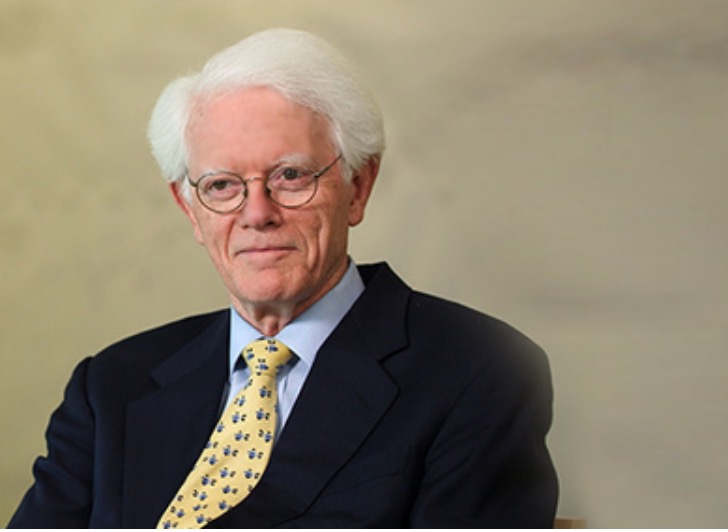Former Fidelity fund manager Peter Lynch shares some of his secrets to success.
When Peter Lynch began work at Fidelity 50 years ago, you could buy lunch for less than a dollar, you had to wait for the mail to read an annual report, and the Dow Jones Industrial Average hadn’t hit 1,000.
Much has changed—but not Peter Lynch's boyish fascination with stocks. Looking spry in a dark blue suit, yellow tie, and sneakers, he recently popped into Fidelity's Chart Room (where market trends were once hand-drawn and posted on the walls) to share some of his investing wisdom with Viewpoints.
For the 13 years that Lynch ran Fidelity's Magellan® Fund (1977–1990), he earned a reputation as a top performer, increasing assets under management from $18 million to $14 billion (as of 1990). Since then, Lynch has mentored virtually every equity analyst at Fidelity. He also authored several top-selling books on investing, including One Up on Wall Street and Beating the Street, and has been a generous contributor to the Boston community, the Catholic Schools Foundation and the Inner City Scholarship Fund.
Whether you enjoy picking individual stocks, aspire to it, or prefer to rely on professional management in the form of mutual funds, ETFs, or managed accounts, his plain-spoken wisdom can help you become a better investor.
What do you need to become a great investor?
Lynch: In the stock market, the most important organ is the stomach. It's not the brain.
On the way to work, the amount of bad news you could hear is almost infinite now. So the question is: Can you take that? Do you really have faith that 10 years, 20 years, 30 years from now common stocks are the place to be. If you believe in that, you should have some money in equity funds.
It's a question of what's your tolerance for pain. There will still be declines. It might be tomorrow. It might be a year from now. Who knows when it's going to happen? The question is: Are you ready—do you have the stomach for this?
Most people do really well because they just hang in there.
The stock market has been on a bull run for more than 10 years now. Is it time for investors to trim their exposure to stocks?
Lynch: Long term, the stock market's a very good place to be. But I could toss a coin now. Is it going to be lower 2 years from now? Higher? I don't know.
But more people have lost money waiting for corrections and anticipating corrections than in the actual corrections. I mean, trying to predict market highs and lows is not productive.
How do you feel when the market drops?
Lynch: Over the 13 years I ran Magellan ® the market went down 9 times 10% or more. Every time it went down, the fund went down more. So I just didn't worry about it.
The stock market's been the best place to be over the last 10 years, 30 years, 100 years. But if you need the money in 1 or 2 years, you shouldn't be buying stocks. You should think about being in a money market fund.
What should investors do when the market eventually tanks?
Lynch: You've got to look in the mirror every day and say: What am I going to do if the market goes down 10%? What do I do if it goes down 20%? Am I going to sell? Am I going to get out? If that's your answer, you should consider reducing your stock holdings today.
Where should long-term investors be looking for opportunities now?
Lynch: Emerging markets have been really hammered. But there are a lot of countries that are doing a lot better. So I think there is potential there. It's not my area of expertise but I think emerging markets could be a place to research.
How did you get interested in investing?
Lynch: My father took sick when I was 7, died when I was 10. I started caddying at 11 in the '50s when the stock market was great. It went up all the time, and people were recommending stocks.
They'd talk about stocks and I'd look at them. I didn't even have any money. But I watched them go up. I said, "Wow, this looks like a great thing to do." So I did. At Boston College, I did a report on the air cargo industry, and I bought $300 worth of Flying Tiger airlines. The Vietnam War took off and they had to fly a lot of stuff to Vietnam.
I think that was just an example of luck, but I knew the reason I was buying. I looked into it, and I said, "air cargo's the big thing." Flying Tiger wasn't carrying people, just cargo. I did work on it, and I said, "it looks like a growth area." I think I paid for graduate school with Flying Tiger.
I'm 75 now (I think middle age is 88 and old's 107). I haven't changed at all. I'm doing the same stuff I did at 19 and 20.
What's the biggest mistake you see individual investors making?
Lynch: The public's careful when they buy a house, when they buy a refrigerator, when they buy a car. They'll work hours to save a hundred dollars on a roundtrip air ticket. They'll put $5,000 or $10,000 on some zany idea they heard on the bus. That's gambling. That's not investing. That's not research. That's just total speculation.
How should individual investors approach picking stocks?
Lynch: Stocks aren't lottery tickets. Behind every stock is a company. If the company does well, over time the stocks do well, and vice versa. You have to look at the company—that's what you research. That's what we do at Fidelity, and that's what I do.
What's a good way to begin investing in stocks?
Lynch: Start with a paper portfolio. Then say: I'm going to put together X amount of dollars in the portfolio—say $10,000 or $100,000. It's paper. Make it big. Pick 5 companies to buy. Then ask why am I buying these 5? It's not "the sucker's going up." I've tried that one. That's not the reason. What is the reason why I like this?
Then you follow them over time and see what you’re good at. Are you good at turn-arounds? Are you good at value stocks? Good at smaller companies?
The important thing is not the fact that the stock went from $3 to $6. Why did it go up? What happened to the story? That’s what research is about. Did the company's fundamentals get better?
How can an average investor get an edge?
Lynch: Ask yourself: Can I analyze the company? Everybody has a good idea of what McDonald's does. But it's hard to analyze biotechnology companies or computer software companies. So ask yourself: Do you know something about the company? What can you add to the math? Do you have an edge?
You could be an interventional cardiologist and you put in a heart pump. You say, wow, this really is an incredible breakthrough, preventing shock, providing hemodynamic support. You're actually in the operating room, seeing this breakthrough way ahead of most people. That's an edge. You need an edge on something.
What do you look for when shopping for stocks to buy?
Lynch: In baseball terms, you want to buy in the second or third inning and get out in the seventh or eighth.
Walmart was in only 15% of the United States when they were a 10-year-old public company. All they did for the next 30 years was go from 15% to 100%. The stock went up 50-fold. They had a great formula, and they just rolled with it in the United States.
How do you know when to sell a stock?
Lynch: Deciding when to sell is exactly the same thing as when you buy it. You have a certain story—why I bought this. This company's going from crummy to semi-crummy to getting better. And the company has plenty of cash, so they're not going to go bankrupt.
When the business goes from semi-crummy to better to good, I'm probably out. You sell the company that was the growth story when there's no room to grow. When Taco Bell was only in southern California, where could they go? Well, they went to central California. Then they were everywhere. I mean, it's a 70-year story.
You have to define when a company is getting close to maturity, and that’s when you exit. Or the story deteriorates. If the story's intact, you hold on.
How do you think about the economy's impact on stocks?
Lynch: I think if you spent over 13 minutes a year on economics, you've wasted over 10 minutes. I mean, it's not helpful. Everybody wants to predict the future, and I've tried to call the 1-800 psychic hotlines. It hasn't helped. The only thing I would look at is what's happening right now.
What advice do you have for fund investors?
Lynch: The question is: Do you understand what you own when you own a fund? Is this the flavor you want? Do you want real action or do you want something conservative? You know, we want the public to be happy. We’re not going to tell people what to do. But we have people to talk to.
Have you ever had a big flop?
Lynch: I've had so many flops. One time I bought a retailer with these great dresses. They were on the cover of Vogue 3 times, and the company had no debt, which is really important. It's hard to go backward if you have no debt. You get an award for that. So they had everything right and all of a sudden this movie Bonnie and Clyde comes out and the hemline goes from above the knee by two inches to the ankle. So the stuff they had was useless, and they didn't have new stuff for the next season. Two years later, things calmed down, but the company was gone.
So you have flops. Maybe you're right 5 or 6 times out of 10. But if your winners go up 4- or 10- or 20-fold, it makes up for the ones where you lost 50%, 75%, or 100%.
You have just celebrated your 50th anniversary at Fidelity. As you look back, what do you feel has changed most?
Lynch: The data now is so good. I remember waiting for the mail to come to our library to check Nike's annual report. Now when somebody reports earnings, it's telecast all over the world. They have an investor presentation. They show a balance sheet. The data's there. And it's free.
So theoretically the individual's edge has improved in the last 20, 30 years versus the professional. The problem is people have so many biases. They won't look at a railroad, an oil company, a steel company. They’re only going to look at companies growing 40% a year. They won't look at turn-arounds. Or companies with unions.
You have to really be agnostic. I think that's why Fidelity’s had so many great fund managers—they're very flexible with what they'll look at.











